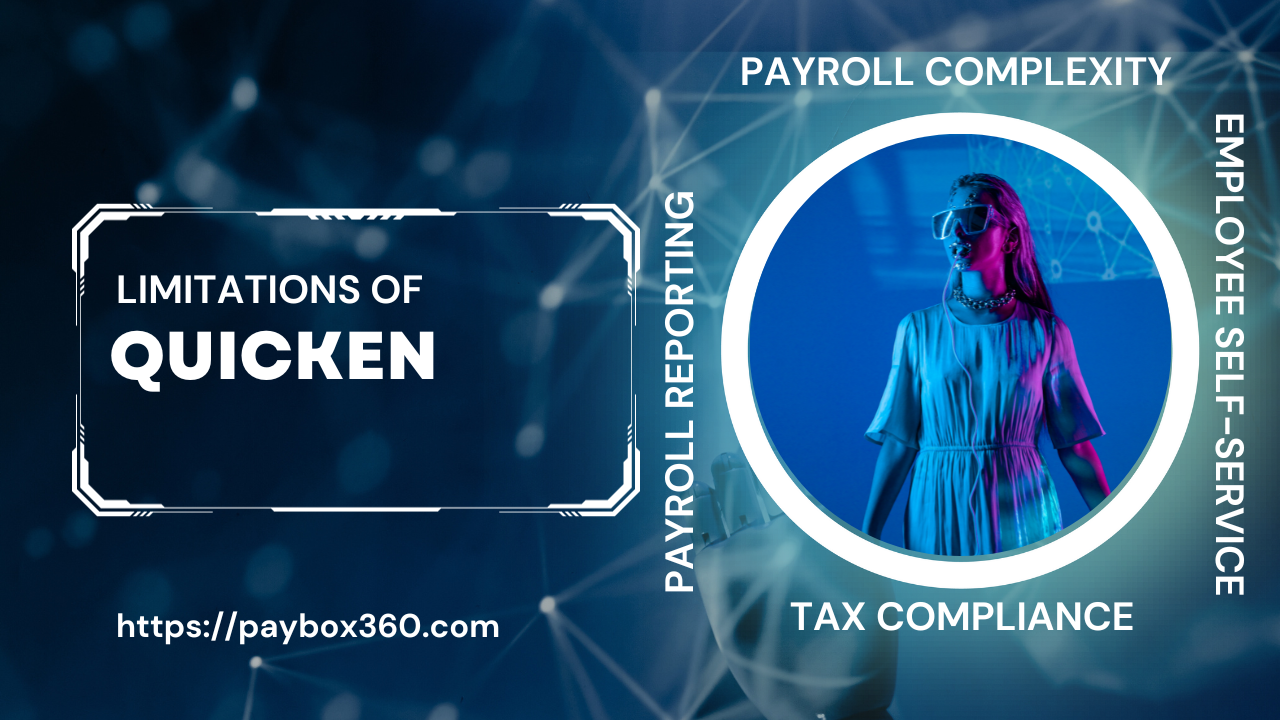What is Quicken?
Quicken is a popular personal financial software application developed by Quicken Inc. It is a personal finance management tool that is great for individuals and families for different financial tasks, budgeting, expense tracking, investment management, and bill payment, but can it be used for payroll as well? In this blog post, we will explore the possibilities of doing payroll on Quicken.
In this article, we will discuss how Quicken can be used for payroll, and highlight the limitations, features, and costs. Identify the users, and check out the alternatives to Quicken.
How can Quicken be used for Payroll?
Users can track their payroll expenses with Quicken but must subscribe to a service or rather make the calculations and update the tax withholding tables regularly. However, its primary focus is not on payroll management, which is a complex and regulated process.
Benefits of Using Quicken for Basic Payroll Tasks.
Although Quicken may not be a comprehensive payroll management solution, it can still offer some benefits for businesses with simple payroll needs:
- Cost Efficiency
Quicken is more cost-effective than many other payroll software. If your business has a small number of employees and basic payroll requirements, it can economize your money compared to more complex solutions.
- Expense Tracking:
Quicken is known for its benefit of tracking. It helps you keep valid records of payroll-related expenses, making it effortless to manage your budget.
- Tax Records:
Quicken may not handle tax compliance thoroughly but assists in tracking tax-related expenses, which is necessary for tax filing and record keeping.
- Integration:
Quicken can be integrated with other financial management tools, such as accounting software, to create a holistic view of your business’s financial health.

Limitations of Using Quicken for Basic Payroll Tasks.
Quicken has limited number of features and does not transfer data to other software easily. It has no online version also (desktop only)
- Payroll Complexity
One of the key limitations of using Quicken for payroll is the complexity of payroll processing. Payroll involves various elements like tax withholding, deductions, benefits, and compliance with local labor laws. Quicken is not specifically designed to handle these intricacies and lacks the specialized tools required for seamless payroll management. - Tax Compliance
Tax compliance is a critical aspect of payroll management. Businesses must ensure that they withhold the correct amount of taxes and submit them to the relevant authorities. While Quicken may assist in tracking expenses and income, it doesn’t offer the robust tax compliance features needed for payroll processing. This is where dedicated payroll software like QuickBooks or other payroll services shine. - Employee Self-Service
Many modern payroll solutions offer self-service portals for employees, where they can access their pay stubs, and tax forms, and make updates to their personal information. Quicken does not provide such self-service features, making it less convenient for businesses with numerous employees. - Payroll Reporting
Reporting is another essential component of payroll management. Businesses need detailed reports to analyze payroll costs, monitor tax liabilities, and maintain records for audits. Quicken’s reporting capabilities are more geared towards personal finance and accounting and may not meet the reporting requirements of a business.

What do the Costs of Using Quicken for Payroll look like?
Quicken offers several versions and a wide array of affordable subscription options, catering to various financial management needs. Here are some of the costs associated with using Quicken:
- Subscription Fees:
Quicken has transitioned to a subscription-based model for some of its products, that is, you will need to pay an annual fee to continue using the software, which varies based on the specific edition and any ongoing promotions. - Software Purchase:
Quicken offers a range of products, including Quicken Starter, Deluxe, Premier, and Home & Business. The pricing varies. - Additional Costs:
While Quicken’s core features can be adequate for basic payroll tracking, you may incur additional costs if you are required to integrate third-party payroll services or tax software to organize your payroll effectively.
Features of Quicken for Payroll Management
If you just want to track your personal financial information, Quicken has all of the features you could want. You can track everything related to your family’s finances in one place without much extra hassle.
- Bugeting:
Quicken provides budgeting tools that allow you to set spending boundaries for different expenses varieties, including payroll. This can help you ensure that you allocate enough funds for payroll and discourage overspending.
- Tax Tracking:
Although Quicken lacks advanced tax compliance features, it can help you keep track of tax-related expenses and deductions. This can be useful for keeping records that are crucial for tax filing.
- Expenses Tracking :
Quicken excels at tracking expenses and income, which can be helpful for businesses to keep tabs on their cash flow. You can categorize expenses related to payrolls, such as wages and benefits, and generate reports to gain insights into your business’s financial health.
Quicken is great for individuals and Families. It can used for either Personal or Business use.
Choosing the Right Payroll Solution for Your Business
The decision of which payroll solution to choose for your business depends on several factors. Here are some considerations to keep in mind:
-
Business Size
The size of your business and the number of employees you have will play a significant role in determining the most suitable payroll solution. Smaller businesses may find Quicken or online payroll platforms sufficient, while larger enterprises may require dedicated payroll software or services. -
Payroll Complexity
Assess the complexity of your payroll needs. If your payroll involves multiple deductions, benefits, and compliance with various tax regulations, you may need a more robust solution. -
Budget
Consider your budget. Dedicated payroll software and services can be more expensive, so evaluate whether the benefits and features they offer justify the cost. -
Integration
Think about the other financial tools and software your business uses. Seamless integration with existing systems can streamline your financial management processes.
-
Employee Self-Service
If providing self-service options for your employees is important, make sure to choose a solution that offers such features.
Considering Alternatives: when Quicken May Not Be the Right Choice.
If your business’s payroll needs to beyond the capabilities of Quicken, you may want to consider alternative payroll management solutions.
A valid alternative is the PayBox360 as Quicken is limited in offers. The importance of payroll accuracy and complaints cannot be over-emphasized.
Quicken falls short as businesses with more complex payroll requirements may need to consider valid alternative solutions.
Conclusion
Quicken is a valuable tool for personal finance and accounting. Still, it is not an ideal solution for payroll management, especially for businesses with complex payroll needs involving complex calculations, tax compliance, and reporting requirements that require specialized software or services. Evaluating your specific payroll requirements and budget is essential to determine the most suitable payroll management solution for your business.
Choosing the right payroll management solution like Paybox360 is crucial to ensuring accuracy, efficiency, and compliance with legal requirements. By weighing the advantages and limitations of Quicken and exploring alternative solutions, businesses can make good decisions that fit their distinct requirement, leading to accurate and compliant payroll processing in the digital age.





